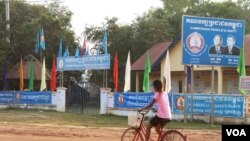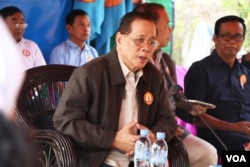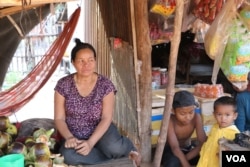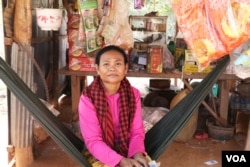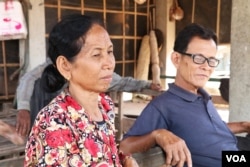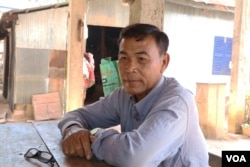A fourth national Senate election campaign is in full swing in Cambodia, with candidates fanning out to rural areas to drum up support among commune councilors, who will elect 62 senators Feb. 25.
Normally in Cambodia, political campaigns like this would be an occasion for discussion and debate about the merits of different parties and policies; but this year, things are different.
In the aftermath of the Supreme Court's dissolution of the main opposition party in November, publicly supporting the Cambodia National Rescue Party, or CNRP, has become risky and, in some cases, illegal.
The elected Senate seats are filled by indirect ballot — only 11,572 commune councilors and 123 National Assembly members can vote — meaning senators answer to political parties, not ordinary Cambodians. Prime Minister Hun Sen's ruling Cambodian People's Party, or CPP, is expected to win all 62 seats in what is effectively a one-party state because any CNRP supporters once eligible to vote in the election have either defected to the ruling party or been replaced by CPP loyalists.
Wary of socializing
It is not just ex-CNRP officials who are fearful. Last week, even low-level supporters and those who had no formal affiliation with the CNRP told VOA Khmer they are scared to discuss politics and even meet with each other socially.
In the Romeas Hek district of Svay Rient province, senior ruling party official Sok Eysan was on the campaign trail for a Senate seat he seems certain to win. Rather than discussing the issues facing the area, he spent much of his stump speech mocking former opposition leaders Kem Sokha — in jail since his arrest last year on charges of seeking to overthrow the government — and exiled opposition figure Sam Rainsy — whom he repeatedly called a "son of a traitor."
"We don't lie like the wind-and-smoke words of the contemptible Sam Rainsy and Kem Sokha," Sok Eysan said.
Near the campaign event, in Chantrey commune, villagers told VOA they were anxious about publicly discussing even the most persistent problems in their area, such as the lack of electricity or running water, and the unpaved road through the commune where dirt is kicked up night and day.
Along that road, Neth Samun, 56, runs a small grocery store often coated in a layer of dust. She and her customers used to chat about social issues, particularly the loneliness and lack of social cohesion in their village since so many young people have migrated away to find work in factories near Phnom Penh. Several of her 11 children are among the migrants, and she cares for one grandchild whose mother is a garment worker.
"Before, we talked about garment factories, garment workers' pay, and our nation's issues, but now we don't dare to talk," she said. "Before, there was a lot of talk when the CNRP existed. But now no one dares."
Pen Samath, 52, who also owns a small shop along the road selling groceries and gasoline, said she was concerned about the potential loss of land to Vietnam, which borders the district.
Alleged Vietnamese border encroachment has been a potent political issue for the CNRP in past years, but most of the opposition's loudest voices on the issue are now in exile.
Pen Samath said she used to discuss Vietnam-Cambodia relations with other villagers and the local CNRP commune chief, Mey Dara. Now, he doesn't stop by her shop.
"I don't dare to talk," she added. "I'm afraid of being mistreated. So I keep silent like the others."
'Is it OK to talk?'
The situation is more intense for those who had a formal affiliation with the opposition party.
Mey Dara, the former CNRP commune chief, said that he was being watched so closely that he hardly left his house.
Without a job or income, the 60-year-old tends to a small rice paddy and vegetable patch near his home. To earn extra money to replace his lost government salary, he and his wife rent out a loudspeaker they own and sell herbal medicine.
"If there is a gathering of four or five people, they will come to watch us," he said, looking at the dusty road in front of his house where small cars and big trucks are passing.
"I can't communicate with villagers like before," he added. "I am afraid that people will be accused of something."
As he spoke, Chab Torn, his 61-year-old wife, got up from a nearby hammock and interrupted her husband. "Is it OK to talk?" she asked. She proposed moving inside the house so nobody could see the couple speaking with a journalist.
Tith Marong, 66, an ex-CNRP district chief and Romeas Hek district councilor who also lost his post, said he was also being watched and feared traveling.
Mey Dara and Tith Marong, who are longtime friends, rarely communicate anymore.
"Now we just meet when joining things like weddings and other religious ceremonies, and we just ask each other about other things, not about politics," Marong said.
'Follow and watch'
The new CPP commune chief, Leuk Sakhun, who inherited the position after Dara was stripped of the role, admitted freely that villagers were under surveillance.
He said former opposition members were being watched in case they "form a group," although the Cambodian constitution guarantees the right to free assembly and association.
"We follow and watch them," he said.
One result of this has been that ordinary people rarely come together to talk about politics, the commune chief said.
"People have been silent after the party was dissolved," he said. "No one talks. Previously, after the local election, people talked more."




